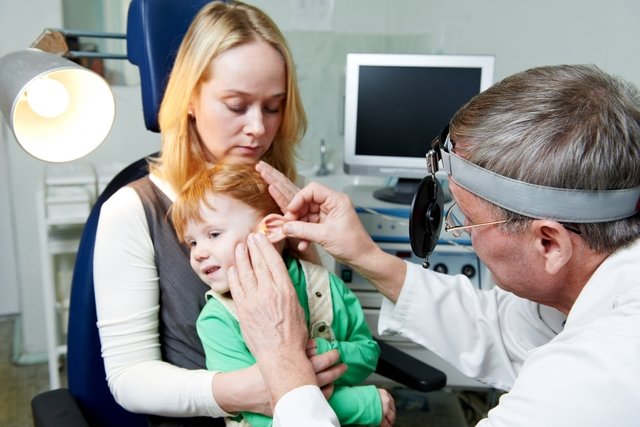The presence of phlegm in the ear is usually caused by fluid accumulation, especially in babies under 2 years of age. However, it can also arise due to colds, sinusitis and allergic rhinitis, for example, especially when it happens in adults.
Phlegm in the ear can cause difficulty hearing, affecting communication and language development in children. Furthermore, in adults, in addition to hearing loss, symptoms such as a dull ear sensation and clicking sounds may also occur.
If you suspect phlegm in the ear, it is important to consult an otorhinolaryngologist, general practitioner or pediatrician, in the case of children.
Symptoms of phlegm in the ear
The main symptoms related to the presence of phlegm in the ear are:
- Feeling of stuffy ears;
- Discomfort or pain in the ear;
- Difficulty hearing;
- Wheezing and/or popping in the ear.
Other associated symptoms include loss of appetite, vomiting, fever and release of yellow or whitish secretion. Additionally, children may have difficulty developing speech.
If you suspect phlegm in the ear, it is important to consult an otorhinolaryngologist, general practitioner or pediatrician, in the case of children. For the diagnosis, the doctor generally takes into account the symptoms, the presence of phlegm in the ear, which is identified through otoscopy and the assessment of the vibration of the eardrum, which may be reduced in this case.
Main causes
The main causes of phlegm in the ear include:
- Infection by viruses or bacteria, leading to inflammation of the ear and the production and accumulation of secretions;
- Frequent colds and flu;
- Allergic rhinitis;
- Sinusitis;
- Enlargement of the tonsils;
- Allergies;
- Ear injury due to rapid pressure change, also known as barotrauma;
- Gastroesophageal reflux.
Furthermore, tumors and malformations of the face and palate, in the roof of the mouth, although less common, are also possible causes for the presence of phlegm in the ear. Learn about other causes of ear discharge.
Which doctor to consult
The most recommended doctor to treat phlegm in the ear is the otorhinolaryngologist, however, the pediatrician, in the case of children, or the general practitioner, for adults, can also identify the cause.
Taking care of your health has never been easier!
What is the treatment like?
The treatment is carried out with the aim of eliminating accumulated secretion and relieving symptoms, allowing the person to hear normally again. Although phlegm in the ear generally improves without the need for specific measures, medications such as corticosteroids may be recommended by your doctor. Furthermore, if the accumulation of secretion is caused by infection, the use of antibiotics may be necessary.
However, in some cases, symptoms may persist or worsen despite treatment, and a surgical procedure may be indicated, which consists of introducing a drain through the ear canal, which is responsible for draining the secretion and preventing accumulation from occurring again. of secretions.
How to prevent phlegm in the ear
In young children, phlegm in the ear can be prevented through breastfeeding, since antibodies responsible for fighting infections are passed on to the baby. Furthermore, it is recommended to avoid pacifiers and cigarette smoke near the child and administer vaccines according to the vaccination schedule.
It is also important that adults and children wash their hands frequently and, in case of illnesses such as rhinitis, sinusitis, gastroesophageal reflux and allergies, they are evaluated by a doctor and appropriate treatment is initiated.
Bibliography
- ATKINSON, Helen; WALLIS, Sebastian; COATESWORTH, Andrew P. Otitis media with effusion. Postgraduate Med. Vol.127, n.4. 381-385, 2015
- HARMES, Kathryn M. et al. Otitis media: diagnosis and treatment. Am Fam Physician. Vol.88, n.7. 435-440, 2013
- STATPEARLS. Otitis Media With Effusion. 2022. Available at: <https://www.ncbi.nlm.nih.gov/books/NBK538293/>. Accessed on 01 Jul 2022
- MILLIS, R; HATHORN, I. Aetiology and pathology of otitis media with effusion in adult life. The Journal of Laryngology & Otology. Vol.130, n.5. 418-424, 2016
- OTORHINOLARYNGOLOGY FOUNDATION. Deafness. Available at: <https://forl.org.br/InformacaoDoenca/Visualizar/27>. Accessed on June 11, 2019

Sign up for our newsletter and stay up to date with exclusive news
that can transform your routine!
Warning: Undefined array key "title" in /home/storelat/public_html/wp-content/plugins/link-whisper-premium/templates/frontend/related-posts.php on line 12
Warning: Undefined array key "title_tag" in /home/storelat/public_html/wp-content/plugins/link-whisper-premium/templates/frontend/related-posts.php on line 13




